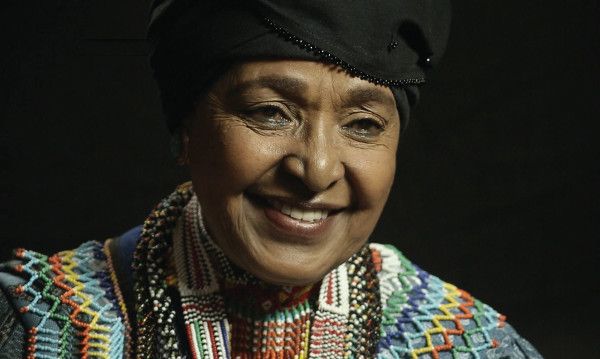Eye For Film >> Movies >> Winnie (2017) Film Review
Winnie
Reviewed by: Amber Wilkinson

Winnie Madikizela-Mandela's daughter Zindzi pretty much sums up the starting point for this documentary about the South African "mother of a nation" when she observes that while her dad Nelson was revered as a saint after his release from 27 years of captivity under the Apartheid regime, her mother was branded "a sinner".
Pascale Lamche, who won a director's award for the film at Sundance, attempts to redress this balance by presenting the entire story - told chronologically - from Winnie's perspective. It's a big task and one which benefits hugely from the presence, at its heart, of Winnie herself, who shows no signs of losing any of her beliefs or steel. But the fact that she is 80 years old gives an indication of just how much Lamche is trying to pack into this 98-minute documentary, which inevitably has to fast-forward through quite a lot - in particular Winnie's younger years - in order to get to the meat of its argument regarding her treatment by her political party the African National Congress (ANC), the government and the press.

For all that Lamche wants to argue how one-sided things were for the woman who suddenly after years of campaigning found herself boxed back in as "Nelson Mandela's wife", her decision to similarly present a single side of the story - albeit one less told - means that caution is required on the part of the viewer in terms of what to take away from it. There is reluctance on the part of Lamche to say too much about some of the more murky areas of Winnie's life, including the killing of 14-year-old Stompie Moeketsi by her bodyguards, which it was alleged she ordered, although she was later acquitted. There is also no mention at all of her 2003 conviction for fraud and theft or the fact that she praised violence in the form of "necklacing", in which a rubber tyre was forced around victims - suspected informers or collaborators - and set on fire.
If the "matyr to the cause" aspects feel over-egged, the film is on stronger ground in her assertions about the attitude towards her by the ANC and the press. She makes convincing arguments about the way that those she was most supported by - women and people in the townships - have been badly let down by the subsequent opportunities offered to them in the 'new' South Africa.
The life of Winnie ends up feeling too complex to be contained by this talking heads procession, with many of those included under-described, so that newcomers to the political landscape of South Africa may struggle to keep up. Even though the focus is to narrow for comfort - the film is still worth seeing for the sheer force of Winnie's charimsa, even if it would benefit from a lot more context.
Reviewed on: 07 Feb 2017














